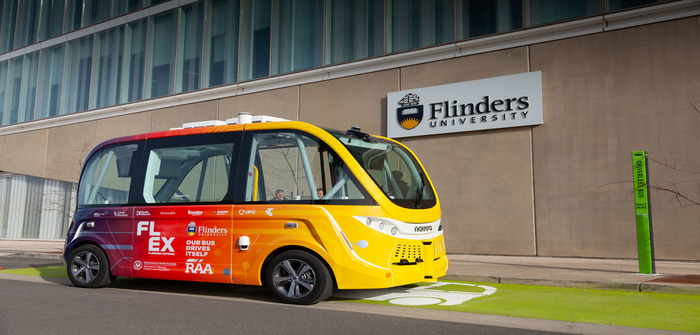Flinders University, located on the outskirts of Adelaide, South Australia, has launched a five-year public trial of a driverless electric shuttle. The ‘Flinders Express’, or FLEX, a Navya Arma electric shuttle, will initially provide first- and last-mile services on one fixed route, but more routes and stops will be added in the future. Rides can be booked online.
The free service started operating autonomous rides every 15 minutes from 20 June. The route is currently limited to services between the Clovelly Park Train Station and Tonsley’s Main Assembly Building (MAB), an old car factory repurposed as a business and community hub. The service will be expanded so that within a year the shuttle will use main arterial roads around the entire Bedford Park precinct.
“Demonstrations and trials of these driverless vehicles that involve the community are a really good way of building acceptance of this type of new technology,” said Professor Rocco Zito of Flinders University.
“Our aim is not to prove the technology but rather expose the public to this new type of transport service and learn from their responses and reactions to help driverless vehicles gain general acceptance.”
The programme is a joint project between Flinders University, the Royal Automobile Association of South Australia, the South Australian Department of Planning, Transport and Infrastructure (DPTI) and a number of industry partners. Last year, it received A$1m (US$740,000) from the state government’s A$10m (US$7.4m) Future Mobility Lab Fund.
The Navya Arma electric shuttle can carry up to 15 passengers at speeds of up to 40km/h, but will be limited to 30km/h during the trial. It will be managed by an onboard staff member informing users of the technology and ensuring safety.
The shuttles will be recharged at a solar-powered charging station to be constructed in the next two months. The charging station will also be available to the public wanting to recharge their own electric vehicles for free.
By Illya Verpraet


